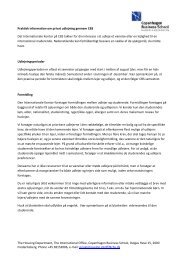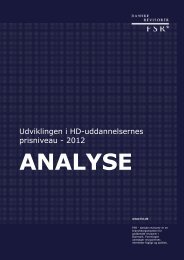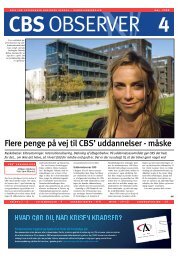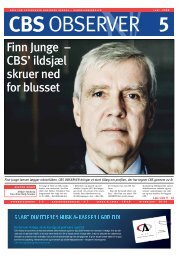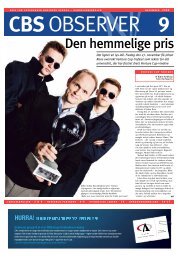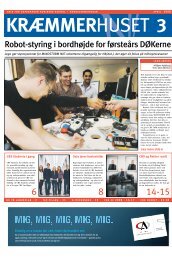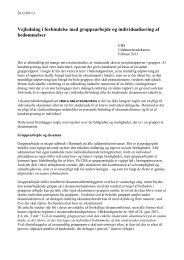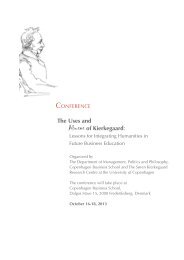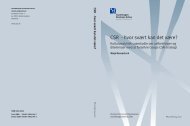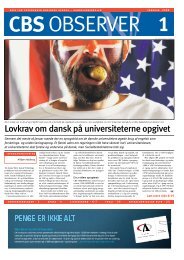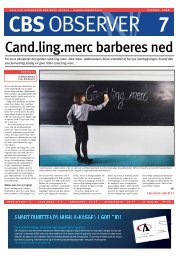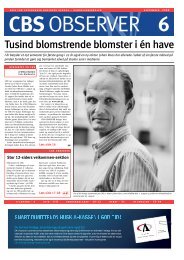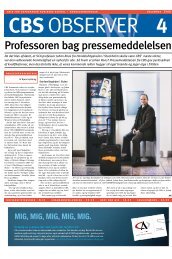2 2i n - h o u s e n e w s p a p e r f o r co p e n h a g e n b u s i n e s s s c h o o lOh to be a PhDJust look at them -we’re role models!Some find the academic world more interesting than thebusiness world. Why graduate when you can take a shotat staying at <strong>CBS</strong> forever? Thinking about taking a PhD?Read on to find out about what kind of skills that takess c h o l a r l i n e s sBy Sebastian SchwolowCartoon: Niels PoulsenTo be or not to be… a PhD – that is thequestion. Or it might be. Taking a PhD isdefinitely one possible way for graduate studentsto go. And whether it is nobler to themind to wrestle the slings and arrows of anoutrageous Fortune 5000, or to actively totake arms against it and try to change thebusiness world, no-one can tell.Ultimately, the question may simply burndown to the choice between an academic ora business career without any sentiment forchanging a troubled world. Not all businessschool graduates finish up their educationwith an overwhelming desire to join the ratrace and climb the corporate ladders to CEOhood.They might even have picked professorsas role models and developed strangeattractions to the academic life of the universityteacher and researcher.It is a clear career choice – especially inthe Danish universities where taking a PhDfar more often than not leads to being exactlythat. Whatever the decisive factor, there area few characteristics that graduates consideringa PhD should bring to the table.Study like mad for a livingMorten Thanning Vendelø, AssociateProfessor at the Department of Organisation,has supervised a number of PhD projects.When asked what it is that makes a goodPhD student, he leans back in silent thoughtand then, after a moment of reflection,answers:- Graduate students who want to take aPhD education should have a good academicfoundation.The formal qualifications include suchthings as above-average grades and a wellwrittenMaster’s thesis. Both are indicatorsthat a student is able to work hard andfocused in an academic context over a longerperiod of time.But that is just the foundation. In manyways, the success of a PhD project is not justdependent on the student him- or herself.PhD aspirants should also make sure theyfind themselves a PhD-supervisor who istruly interested in their project idea – someonewho can motivate them and help from atheoretical point of view.- The completion of a PhD project is theresult of a good interplay between supervisorand student. Ultimately, though, success willlargely depend on a student’s personal attitudetowards their project, Morten ThanningVendelø points out and goes on to explain:- I usually cite the 200-page goal. Youmight end up writing a few pages moreor less, but 200 pages is usually what youaim for in your thesis. To reach that goal,you have to be disciplined. When at work,remember to work!To thine own self be trueIn Morten Thanning Vendelø’s little blackbook of advice, dedication and endurance areheavily underscored as the truest of academicvirtues. They do not, however, stand alone,and nor should the prospective PhD student– sociability is another.PhD students should like the idea of teachingothers. As the core objective of a PhDeducation in Denmark is to become a universityacademic, the teaching is an importanteducational experience in itself.Most importantly, however, students shouldbe honest with themselves. They should askthemselves such questions as; “Is this reallywhat I want?” and “Do I actually like sittingdown reading and writing?”. If these questionsprompt a loud and clear “Yes!”, the finalPhD-ingredient is a strong and abiding drive.- They have to have an “itch” of some sort,something that keeps them going – a realand deep interest. They need to care aboutwhat they do, as Morten Thanning Vendeløexpresses it.Boarding the scholar-shipIf you want to become a research fellow at<strong>CBS</strong>, that is to receive the funding for a PhDfrom the business school, there is one bighurdle you have to overcome before you canstart researching: you have to apply for anadvertised scholarship.Maja Horst, Associate Professor at theDepartment of Management, Politics andPhilosophy, heads one of <strong>CBS</strong>’ doctoralschools. These PhD schools are the organisationalsetup for the PhD education at <strong>CBS</strong>.Each brackets several departments of similarresearch orientation under a commonadministrative umbrella and is responsiblefor managing the allocation of supervisors,the creation and approval of courses, themeasurement of student progress and thearrangement of final assessment.Every research fellow admitted to <strong>CBS</strong>becomes part of one of the doctoral schools,and Maja Horst is well infor<strong>med</strong> as to whatit is that the members of a <strong>CBS</strong>-assessmentcommittee look for in a suitable applicationfor a PhD scholarship.- You absolutely need to have a good projectidea. It is also essential to know the stateof the art within the field in which you wantto do research. And the application shoulddemonstrate sound knowledge of methodsand theories commonly used in their researcharea – the method description is usually theweakest point in the applications we receive,Maja Horst explains.Fitting into the wholeNext, project ideas have to be relevant withregard to current research and specificallythe research conducted at <strong>CBS</strong>. Therefore, itis also essential for applicants to know whatkind of research is being conducted at <strong>CBS</strong>and how their own project idea fits in.- In general, it’s not a good idea to dosomething that nobody else has done. Whilenovelty is good, it should build on researchthat already exists at <strong>CBS</strong>, Maja Horst recommends.If your project idea holds water, the nextcriterion that will be assessed is your grades.This one’s pretty straightforward – the betterthe grades, the higher your chances ofgetting a PhD scholarship. Publications are aplus and applicants are encouraged to submitwritten works with their applications.Presenting the assessment committee witha credible timeline and work plan for yourresearch is the final absolute neccesity. Thinkof if as an investment plan – <strong>CBS</strong> wants toknow if you can generate a return on theirscholarship within the prescribed three years.1Of course, there is always the possibility to go it alone without the funding. After all, ashas been famously remarked, “Genius is born – not paid.” <strong>CBS</strong> therefore offers optionsfor PhDs not directly funded by the school itself. Read more at:http://uk.cbs.dk/degree_programmes/phd/different_routes_to_a_phdRob Veitch, Ather Nawaz and Moshe Yonatany– three international PhD students at <strong>CBS</strong>c b s p h d - c a s e sBy Sebastian ScwholowRob Veitch, Ather Nawazand Moshe Yonatanyare three PhD studentsat <strong>CBS</strong>’ Department ofInformatics. The threescolarly fellows are fromNew Zealand, Pakistan and Israel, respectively.Rob Veitch, a former psychologist, chose to take a PhD at<strong>CBS</strong> as part of a career change. After working as an industrialpsychologistin the humanresources fieldfor several years,Rob found thata PhD was achance for himto cater to otherinterests thanhis professionalones so far.- I have alwaysbeen interestedin the area ofAther Nawaz - <strong>CBS</strong> Informatics PhD.study that I’mnow researchingthrough my PhD. When the opportunity came up, I usedit sort of as an opportunity to change careers, Rob Veitchexplains.Rob is still undecided as to whether or not his futurecareer is going to play itself out in front of an audience ofstudents:- Directly after graduating I would like to go back andwork in industry for a little while. But eventually I wantend my career working in academia, he says.Ather Nawaz had different reasons for taking up a PhDat <strong>CBS</strong>:- Actually, I did my Master’s thesis at <strong>CBS</strong>. I like the environmenthere. I wanted to do a PhD in Denmark becauseit was only for three years. Another reason was that thenet money I would get paid to do a PhD in Denmark wasalmost the same as I would earn working in industry forthree year. So why not put a PhD under my belt? I’ll do myPhD and then head back to industry, says Ather Nawaz whohas no intention of teaching as a life-career.Moshe Yonatany was lured into taking a PhD at <strong>CBS</strong> bythe prospects of a profession that is both interesting andallows freedom:- My partner is Danish, and I’m from Israel, so I wanted tobe able to travel fairly freely between the two countries, saysMoshe Yonatany, who had found most of the jobs that he’dhad during his life quickly turning repetitive and thinkingthat the PhD represented a chance to do something new.All three PhD-student imagine that having a PhD willimprove their chances in the labour market afterwards.- In some companies, the kind with lots of research goingon, they prefer PhDs, Ather Nawaz points out, while RobVeitch thinks that a PhD will lower the threshold at whichpeople start listening to you:- From my previous experiences I’ve found that if youdon’t have a PhD and you’re young, people are less willingto listen to you even though you may have learnt a lot at,say, master’s level and are well able to make a valuable contribution.1Rob Veitch - <strong>CBS</strong> Informatics PhD. Moshe Yonatany wasunfortunately not available to have his photo taken.
c b s o b s e r v e r 1 f e b r u a r y 2 0 1 0 2 3The visitors have the PhD-advantageTaking your education at <strong>CBS</strong> gears you to a career in the business world, not the academic world.But that may be changing, channelling more <strong>CBS</strong>-students into the PhD programsl e v e l l i n g t h e f i e l dBy Sebastian SchwolowPhoto: Liselotte ØstergaardYou don’t get to go from schoolright back to school at <strong>CBS</strong> – atleast only rarely. Only a small percentageof <strong>CBS</strong>’ PhD scholarshipsare given to <strong>CBS</strong> students whowant to continue with a PhD directlyafter they have graduated fromtheir Master’s.According to Peter Lotz, ViceDean of PhD Education at <strong>CBS</strong>,there are two main reasons for thispattern: Good <strong>CBS</strong> students generallyhave had no problems gettinglucrative jobs in business. Also, the<strong>CBS</strong> curricula are not targeted aPhD study.Home team disadvantage<strong>CBS</strong>, being a school of business,has traditionally been chosen asa place of study by students whowant to learn to do just that – business.That is why the study programsand education at <strong>CBS</strong> is generallymore oriented towards preparingstudents for a work- life inbusiness than an academic career.- We have a bit of a problemsince we are not preparing ourown Master’s students well forthe PhD program. We give ourown students a relatively broadtraining in terms of subjects anddisciplines. Likewise, our methodtraining is not very deep. However,to pursue a PhD degree you needto specialise. This is actually why<strong>CBS</strong> hires many PhD students frommore traditional universities, PeterLotz points out and goes on:- This results in an advantagefor the applicants from fieldswhere the PhD has a long traditionover our own applicants from<strong>CBS</strong>. It’s also why we have moreforeign MSc’s entering our PhDprogrammes than we have <strong>CBS</strong>graduates.Training the local talentBut <strong>CBS</strong> is working to do somethingabout that. Peter Lotz andhis colleaguesare these dayscontemplatingways and meansto offer a modifiedversion ofthe second yearof <strong>CBS</strong> Master’sstudies.- Our idea isto offer interestedstudentsa second year,which is morefocused onmethods thanon subjectareas, Peter Lotzexplains.For students taking advantage ofthis offer, the vision also includesan adjustment of their Master’sthesis in a way that lets them makecomprehensive use of the methodsand approaches acquired duringthe second year of their Master’s.- The idea is to be able to makethe transition from the Master’slevel to the PhD level smootherfor <strong>CBS</strong>’ own graduates, Peter Lotzsays.‘The PhD title in itselfhas very little value in theDanish labour market forsocial science candidates.You don’t get much creditjust because of the title.The PhD is valuable onlybecause of the knowledgeyou have gained.Peter LotzVice Dean of PhD EducationWhy shoot at the title<strong>CBS</strong>’ Vice Dean of PhD Educationdoes, however, point out that thereis another problem for PhD candidates– at least in Denmark:- The PhD title in itself has verylittle value in the Danish labourmarket for social science candidates.You don’t get much creditjust because of the title. The PhDis valuable only because of theknowledge you have gained, PeterLotz comments.He compares the Danish recognitionof an academic title to how itis perceived on the continent, forexample in Germany where titlesin themselvesare worth muchmore. While aPhD doesn’t decidedlyharm youin the Danishlabour market…- As a PhD inDenmark youhave to provethat your trainingis valuable. Ifyou want to becompetitive, youhave to convincinglydemonstratethat it wasbetter to spendthree years taking a PhD than startingright off with work, Peter Lotzpoints out.So unless they want to spend therest of their lives in academia, whyshould people become PhD’s?In Peter Lotz’ opinion, studentsshould pursue a PhD if they areinterested in researching a specifictopic and willing to devotethemselves to a thorough training,especially in scientific methods.For such students, another threeyears of formal training will havea good chance of yielding a higherlife income than expertise based onbusiness experience.1Vice Dean of PhD Education Peter Lotz says that you often more skills thanyou acquire after five years of university education to make it as a PhD.Jan Skovgaard – navigator turned PhD-fellowJan Skovgaard is a PhD fellow at the Institute for Innovation and Organisational Economics.Graduating as a navigator in 1990 he never thought that he would ever go back to school.Jan Skovgaard worked for the Danish Maritime Safety Administration, where his area ofexpertise was ISO9000 and quality management implementation, for seven years. Then hespent another six years working at Danish National Survey and Cadastre’s hydrographicaloffice as an international coordinator.In 2009, he applied for an open PhD position at <strong>CBS</strong>, was accepted and began his studiesin the autumn of the same year. Why did he goback to school?- Well, it wasn’t because I wanted to make acareer. I just rather enjoy learning and being ableto get deeply involved with subjects that I am interestedin, he explains.For Jan Skovgaard, his PhD-student life is notmuch different from work life timewise – nine tofour. And though he doesn’t earn as much as he usedto, he claims to be content and that money isn’t aproblem. There is, however, one thing that he findschallenging:- In my previous jobs I didn’t have to work to getA’s all the time. And then there’s the teaching, hereflects and smiles at the question of whether or nothe’ll go on to go to teach at <strong>CBS</strong> once he has finishedhis PhD.- Right now I have no idea what I’m going to dowhen I finish, Jan Skovgaard says.1Ida Lunde Jørgensen – thinking about taking a PhDIda Jørgensen will graduate as an MSc in International Business and Politics in 2011.These days, she is considering a PhD as a real option for her life after graduation.- I always wanted to be a professor. I love to research things in depth and spendlots of time with a particular topic, Ida Lunde Jørgensen says.Ida thinks that being a researcher at a university is a job that offers luxury in theform of a dynamic and diverse research environment. She is looking for a job thatnot only rewards her financially, but also offers her intellectual stimulation.- A PhD is perfect for that, says Ida Lunde Jørgensen who, even though she is abusiness school student doesn’t really find the prospect of going out there to do onlybusiness all that attractive. She has had severalresearch and teaching jobs in her life and thinksshe has gained a good understanding of the obligationsthat come with a non-academic job:- I’ve had so many years of work experiencethat I feel I can contribute with a lot of knowhowfrom the world outside <strong>CBS</strong>’ walls, Idaexplains, emphasizing that a PhD if anythingshould be about the real world.The main areas of interest that Ida LundeJørgensen would like to investigate as aresearcher are sustainability and the relationshipbetween economics and art. She is optimisticabout what a future in academia might bring:- We are a new generation of academics andto us being an academic means something different,Ida Lunde Jørgensen points out.1



